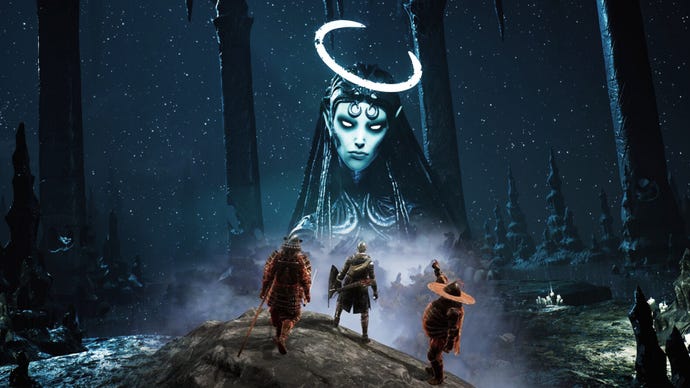Can we please stop expecting FromSoft to ‘learn from’ every new Souls-like?
Better co-op in Elden Ring? Broad difficulty options in Dark Souls? You’re missing the point!
It still baffles me that the industry has not come up with a new term for 'Souls-likes' we can all agree on. Perhaps that’s partly to blame for why every game that rubs elbows with FromSoftware’s work has to be compared to its inspirations. Whatever new features any new game introduces – or whatever existing mechanics it tweaks – inevitably get called out as 'the best new version' that the original Japanese developer needs to incorporate into its next project.
No, FromSoftware’s games don’t need to borrow from their inheritors, no more and no less than they need to learn from their contemporaries.
Before this goes off the rails, this isn’t a blanket defence of the studio’s work, or a suggestion that it’s somehow infallible and therefore its games exceed whatever the imitators come up with. Even outside of the vast catalogue of games we can refer to as 'Souls-likes', FromSoft’s own games change and alter what you could think of as staple.
You can easily find fierce arguments against the ease and availability of fast-travel in Dark Souls 2 onwards, which many believe robbed the games of their horror and unease. Mistakes in the original Dark Souls were costly. You died a lot, and the game expected you to learn how to navigate the run from the nearest checkpoint back to the boss fight on your own. Once you strayed too far off from a Bonfire, you were effectively cut off from the rest of the world. It felt hostile every step of the way.
But was all of that by design, or a byproduct of certain decisions made during development? Perhaps it was a technical limitation that some see as a prophetic Miyazaki moment. Blighttown likely wasn’t intended to run at 25fps for most of it, and there’s no way you can convince me that the Lost Izalith we got is the one FromSoft intended.

You can even trace these mutations as far back as Demon’s Souls. Two of that game’s most defining aspects are also its most controversial; healing relied on finite resources, which drove lesser-skilled players to pause their adventure in order to farm enough of a healing cache to continue, and World Tendency is so inscrutable that not even the Demon’s Souls remake understood what it was even attempting to do/be.
Before the term Souls-like was even invented, FromSoft realised that perhaps a renewable source of healing is better, so Dark Souls introduced the Estus Flask – which would end up being a mainstay in (almost) every game since. Why did it abandon it in Bloodborne? We may never know! Even as recently as Elden Ring, a game with intentional conveniences and quality of life tweaks to make Dark Souls diehards squeamish, the studio has continued to refine and alter its own rules wherever it saw fit.
The point is, you can’t expect every new take on that formula from the studio’s many, many fans to somehow inform the next FromSoftware project. Co-op and difficulty options are the two that always come up.
I can name several Souls-likes that are much more friendly to play in co-op, offering far more straightforward ways of getting players together. The top-seller Remnant 2, and its predecessor do co-op better. But those games are built with co-op in mind, and the procedural nature of their levels is designed for group discovery, and re-playing the same world over and over in different settings (solo, co-op) and with different hosts. Remnant also has difficulty levels, but you can clearly tell that anything above the default is made for 1% of the player base; the sort that do naked runs in 'Souls-likes' all the time.
.jpg?width=690&quality=70&format=jpg&auto=webp)
So many other games do things like that differently. The Star Wars Jedi games borrow more than a few elements from Souls (and even Sekiro!), but their difficulty options are almost a necessity. A Star Wars game needs wider appeal, especially considering the heavier emphasis on narrative. I would also argue that no single difficulty option offers a comparable experience to the tuned stock difficulty of Souls, be it in challenge or precision.
And yes, FromSoftware games do offer ways to help lesser-skilled players. Co-op has always been that equaliser. So much so that Elden Ring let you summon your own co-op AI if you don’t happen to have any friends.
The upcoming Lords of the Fallen is a Souls-like with a unique two parallel worlds mechanic where the game essentially exists on two planes. Should be expect Elden Ring 2 to do that, now? If there’s one thing I would like FromSoftware to “borrow” from its developer fans, its better use of the hardware and a more competent technical know-how. I don’t need the next game to look as good as the Demon’s Souls remake, but it should run and look as good as games that come out the same year.
Going back to the Souls-like term, it’s quite amusing to remember that what we think of now as first-person shooters were all called Doom clones back when id Software’s landmark game showed people something they had never seen before. Imagine asking a new Call of Duty to borrow a feature from Doom, or Battlefield from Tribes! The Souls-like genre may not be nearly as established, but it’s already broad enough that we need to stop imagining this “perfect” Souls-like.
